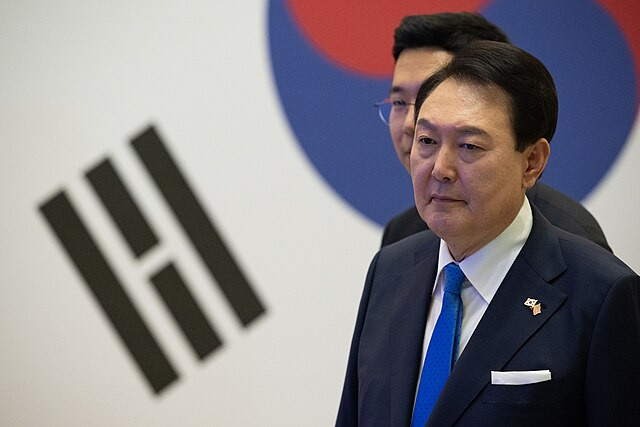South Korean authorities have escalated their investigation into President Yoon Suk Yeol, requesting an arrest warrant for the impeached leader over his controversial martial law decree. The Corruption Investigation Office for High-Ranking Officials (CIO) filed the request with the Seoul Western District Court on Monday, alleging abuse of authority and orchestrating a rebellion.
The warrant request follows weeks of political turmoil triggered by Yoon's December 3 declaration of martial law, which lasted mere hours but plunged the country into a constitutional crisis. The decree, unprecedented in South Korea's modern democratic era, led to the deployment of heavily armed troops to encircle the National Assembly. Lawmakers managed to convene and vote unanimously, 190-0, to lift martial law, halting Yoon's order in its tracks.
Yoon's attorney, Yoon Kap-keun, filed a challenge with the court, calling the warrant invalid and arguing that the CIO lacks authority to investigate charges of rebellion. "An incumbent president cannot be prosecuted for abuse of power," the lawyer said, emphasizing that even when investigations are permitted, they should be conducted with "utmost restraint."
While South Korean law generally grants presidents immunity from prosecution, this protection does not extend to charges of rebellion or treason. Legal experts remain divided on whether Yoon can be compelled to face questioning if the court approves the warrant.
The martial law decree marked the culmination of escalating tensions between Yoon and the liberal opposition Democratic Party, which holds a parliamentary majority. Yoon justified his actions as a response to what he called "anti-state" behavior by the opposition, accusing them of obstructing his governance. However, critics, including opposition lawmakers and human rights groups, have condemned the decree as an authoritarian power grab reminiscent of South Korea's military regimes of the 1980s.
Yoon's justification for the troop deployment has been further undermined by testimony from Kwak Jong-keun, the now-detained commander of the Army Special Warfare Command. Kwak told the National Assembly that Yoon ordered troops to "quickly destroy the door and drag out the lawmakers" during the assembly's emergency vote to lift martial law. Kwak said he refused to carry out the order.
In addition to the assembly incident, Yoon is accused of sending military personnel to the National Election Commission (NEC) under the guise of investigating alleged vulnerabilities in its computer systems. Critics have dismissed these claims as baseless conspiracy theories fueled by right-wing media, particularly given the opposition's landslide victory in the April parliamentary elections. The NEC has categorically denied any irregularities, stating there is no evidence of election fraud.
The fallout from Yoon's actions has been swift. On December 14, the National Assembly voted 204-85 to impeach him. His presidential powers were immediately suspended, and Prime Minister Han Duck-soo temporarily assumed leadership until his own impeachment over unrelated issues last week. Deputy Prime Minister Choi Sang-mok now serves as interim president while the Constitutional Court deliberates on Yoon's fate.
For Yoon to be formally removed from office, at least six of the nine Constitutional Court justices must uphold the impeachment. However, with three seats currently vacant, the court's decision could face delays. The vacancies have raised concerns about the potential for prolonged political instability, particularly as Choi has yet to announce whether he will appoint new justices before the court rules on Yoon's case.
The investigation into Yoon has already ensnared several high-ranking officials, including his defense minister, police chief, and key military commanders. Maj. Gen. Moon Sang-ho, head of the Defense Intelligence Command, was arrested for allegedly ordering troops to the NEC on Yoon's behalf.
Han Min-soo, a spokesperson for the Democratic Party, urged the court to approve the warrant, calling Yoon's detention the first step toward "ending the rebellion and restoring normalcy." Meanwhile, Yoon's supporters have rallied against the investigation, arguing that the president's actions were necessary to maintain order during a period of political uncertainty.




